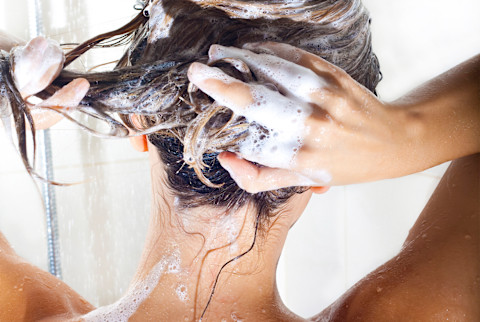Facing Acne & Irritation? This Derm Says You Might Want To Check Your Shampoo

You've piled on hydrating ingredients, swapped over to hypoallergenic makeup, and steered clear of harsh detergents and disruptive preservatives. And yet, a bout of breakouts or annoying irritation still makes its unwelcome appearance. Sigh.
Sometimes, the occasional pimple just, well, happens—even those with an immaculate skin care regimen can face some blemishes from time-to-time. But if your irritation seems relentless or your clogged pores just won't let up, there's another avenue worth exploring: your hair care products.
Unfortunately, your trusty shampoo or leave-in might be contributing to acne and inflammation. Here's how to tell.
The link between hair care products and skin issues
All hair care products deposit residue on your hair (this is a good thing; you want those nourishing ingredients to remain on the strands instead of swirling down the drain). However, that residue actually sits on the skin for quite some time: According to board-certified dermatologist Iris Rubin, M.D., founder of SEEN Hair Care, the residue from hair products travels down your face and body while you rinse, and it can transfer to your skin from your hair, towel, or pillow post-wash.
Specifically, her research suggests that residue from shampoo and conditioner can remain on the forehead, cheeks, scalp, and back for up to two hours1. And for styling products (think leave-ins and curl creams), that residue remains for up to four. That's a pretty big window for ingredients to seep into the skin and cause some unwanted irritation.
Perhaps it goes without saying: If your hair products contain iffy or pore-clogging ingredients, that two- to four-hour window can be a waving red flag for irritation.
What to look out for in your products
If you have a regular rotation of clean hair products yet you're still experiencing some irritation, these common ingredients might be to blame:
- Oils: Oils are a mainstay in clean hair care, but allow us to remind you: Certain oils can be comedogenic. A common culprit is coconut oil, especially for acne-prone skin, but it ultimately differs from person to person (read: some skin types can be sensitive to marula oil, while others remain A-OK). That said, if you know a certain type of oil doesn't work for your skin, you might want to avoid it in hair care as well. There are plenty of others to choose from for glossy, conditioned strands.
- Fragrance: Just as you might avoid fragrance in skin care and makeup products (it can cause atopic dermatitis, especially for those with an already compromised skin barrier), you'll want to do the same for hair care. A flowery scent might be nice, but those ingredients can do damage when they're deposited on sensitive skin. And remember: Even natural fragrances, like essential oils, can be irritating for some. If you've committed to a fragrance-free skin care arsenal but are still facing some irritation, perhaps check if your hair products carry any musk.
- Silicones: Silicones are occlusive, which allows them to seal moisture in the hair. This may lend a silky texture to your strands, sure, but that occlusive nature can also trap other ingredients along with it. So, say, if your shampoo comes loaded with the aforementioned pore-clogging players above, the silicones can trap those ingredients into the skin with ease, says Rubin.
The takeaway
If you're facing some unexplained irritation and breakouts, your hair care products might be to blame. Perhaps take a closer look at your labels and reach for noncomedogenic, silicone- and fragrance-free options.
In other words, you want to be just as vigilant with your hair products as you are with a coveted moisturizer or cleanser. As Rubin tells us, "Hair care is skin care," and we couldn't agree more.
